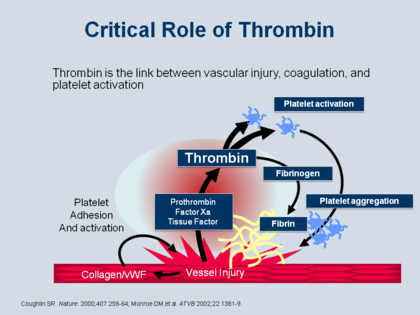Weitz - The Coagulation Cascade: Review of Physiology and Clinical Applications - Figure 2
Critical Role of Thrombin
Coagulation is an orchestrated process that begins with vessel injury, as shown in Figure 2. For example, a serious vessel injury might occur at the site where an atherosclerotic plaque ruptures or erodes, and this disruption of the vessel surface exposes subendothelial collagen and Von Willebrand factor, which provide the nidus onto which platelets adhere and become activated. Exposure of the subendothelium also results in the exposure of cells that constitutively express tissue factor. Tissue factor is the spark for the coagulation cascade. It ignites a series of reactions that result in a burst of thrombin formation – and it is this thrombin that is the link between the injury, the spark, the coagulation process, platelet activation, and inflammation.
As shown in the bottom center of the Figure, tissue factor triggers factor Xa generation. Factor Xa then converts prothrombin to thrombin, and this thrombin amplifies the whole process by feeding back to generate more thrombin, by serving as a potent platelet agonist, and by converting fibrinogen to fibrin. It is then these fibrin strands that form the support structure for a clot.
Once the platelets are activated they begin to aggregate
If we look at this process in a little more detail, we go from vessel injury and tissue factor exposure to thrombin generation, followed by thrombin conversion of fibrinogen to fibrin and the subsequent platelet activation, as shown in the next Figure. Weitz JI. Am J Med 2013; published on-line at http://education.amjmed.com/00000.
References
[1] Coughlin SR. Thrombin signalling and protease-activated receptors. Nature. 2000;407:258-264.
[2] Monroe DM, Hoffman M, Roberts HR. Platelets and thrombin generation. Arterioscler Thromb Vasc Biol. 2002 ;22:1381-1389.
